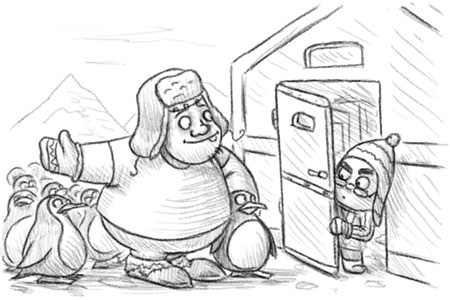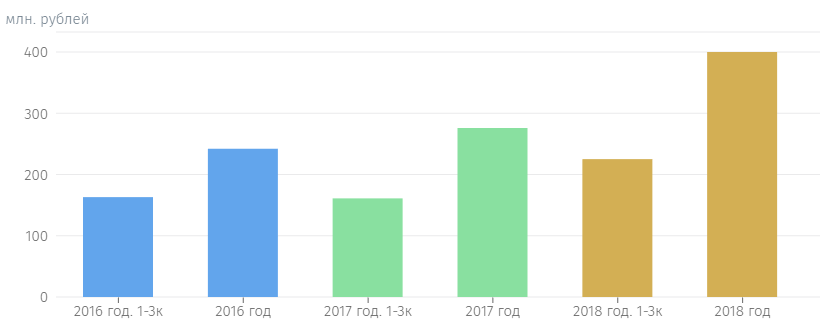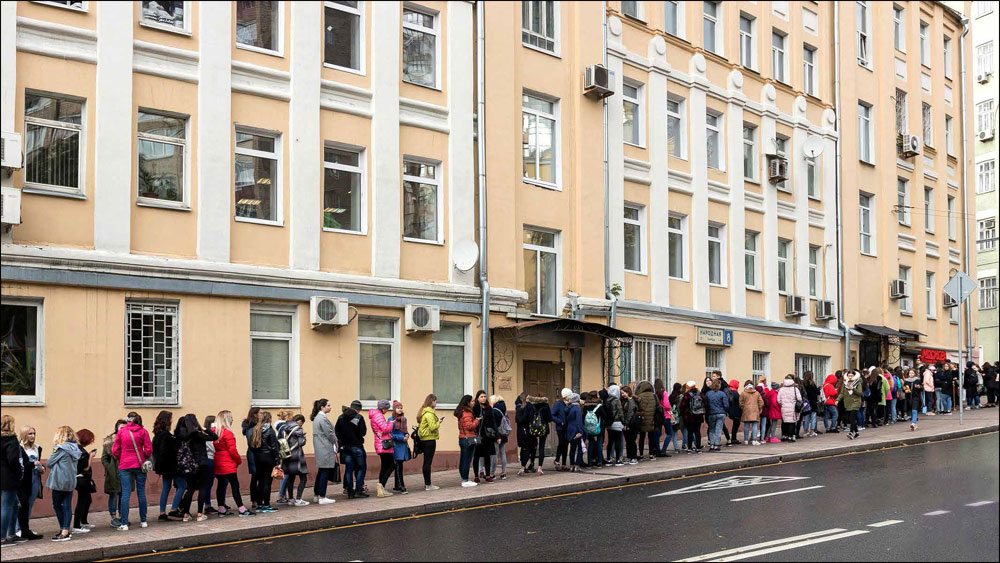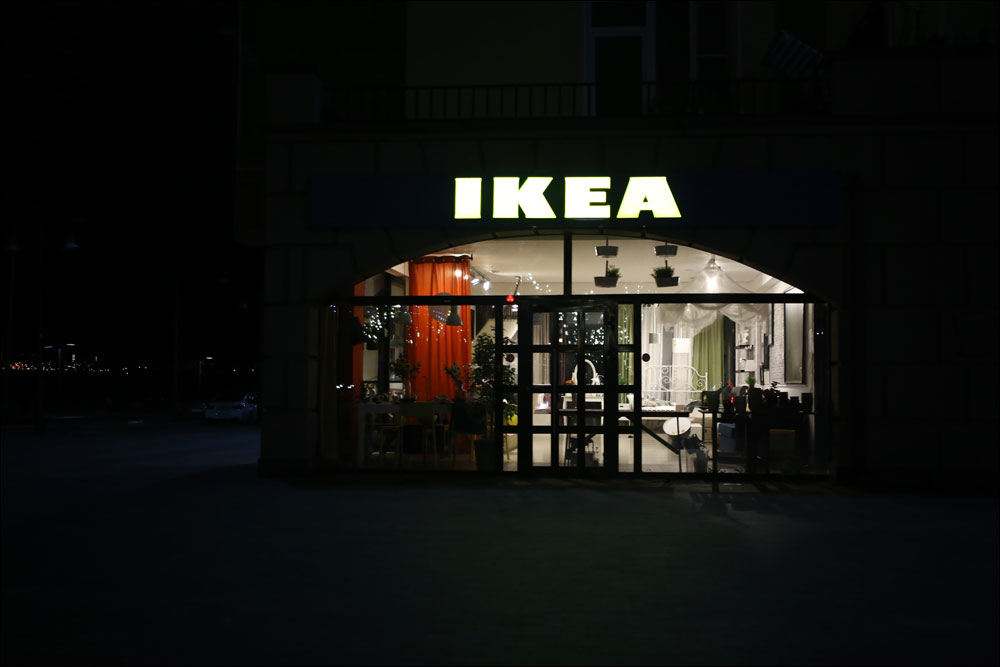What happens in retail

Earlier, when journalists came to us, and asked what our development plan was for 5 years, we showed the map of the galaxy in the entire wall of one of the cabinets. It was called: "Network Development Plan." Now is the time to do it seriously. It turns out there is a methodology. It turns out that it is not only boring, but also works. In a sense, it feels logical and correct: to check, obviously, we can only on the map of the galaxy in the distant future.
In general, while we took into account natural factors, such as the fact that the purchasing power of the population will soon decline throughout the country, a bunch of examples have come up. And so I decided to tell a few individual things about what is happening in retail in general because of this your digital world.
')
Because it is interesting and sudden.
It turns out that the future has already come, it just is not very evenly distributed. And yes, we are no longer in the ass in terms of the economy. Shifts are visible. I'll tell you now.
We are no longer in the ass
In the lease, everything works according to the marginal margin principle: the landlord wants to earn as much as possible, but it is not profitable for him when the tenants move out. Therefore, a dynamic balance is established between how much the tenant earns (excluding rent) and how much the tenant takes from this. When renting goes up, this is a sign that tenants can pay more.
Judging by this rule, the country is gradually coming out of the crisis. This is usually noticeable by the increase in rent. The stakes began to grow in the summer (and this is not related to the football championship, it is too short).
Well, here is a quote from Forbes: “Today we are witnessing a recovery process of growth in commodity circulation and incomes of the population, compensating for the losses of previous years, especially in 2015-2016. To reach the parameters of even the most prosperous 2014, it will take time and effort. It should be recalled that by the end of 2017, the country's population had a negative growth rate of real incomes by 2014 (-11%), while in real wages it was about -5%. ”
We felt it all very clearly. The crisis has cost us quite dearly, and it seems that it is finally ending. We now have fun opening new stores in Moscow (we want another 6 for the New Year plus popapes), and our revenue is growing year-on-year. Wholesale too. Here are the graphics:

The second piece of 2018 is a plan. All this fun in numbers is here .
But there is still a paranoid opinion that it’s too early to rejoice: maybe this is only a short thaw. But it will definitely not be much better, the world has already changed. You need to get used to living within your means and more thoroughly fight for every penny. It makes no sense to somehow move away from this strategy.
Instant delivery
This is the trend of delivery of any product that you need in 2 hours. It is clear that the future is behind this: food in 20-30 minutes has already been learned to deliver at the aggregator level, online shopping is not too difficult. We also work with it and even conducted tests with such delivery options, but there is no result yet. A bunch of contractors with their cockroaches, complex APIs, a fairly high price. But all this will change rapidly, and somewhere in a year everything should work out in Moscow as it should. At least everything goes to this.
Here is a publication about the 90-minute delivery. New concept - delivery from stores, and each store - a separate hub. A pedestrian courier arrives, dude skating or roller skating, picks up the food and goes to the customer. The problem in the case of our beta testing was now in the qualification of Moscow couriers, more precisely, their knowledge of the Russian language. I think in time the problem will be solved.
Now look what has already happened more interesting in this area. Do you know the mobile shop? This is when grandfather Mikhalych buys an old broken-down "loaf" and sells it right in the village. Now, instead of the grandfather will be a robot. Here it is . There is a version with a remotely controlled store even when the robot carries the right product to the right places. It is assumed that these things will be as contextual advertising: where there is demand, they will come, quickly rejected and leave. For example, in the morning near the university they will be drinking coffee, in the afternoon they will go to sell ice cream on the city’s embankment, and in the evening they will return to the university hostel with beer and condoms.
Then individual persecution will begin, but this is already quite fantastic. But you absolutely future, context-dependent city . I'm waiting for him straight.
Here “Burger King” made a bus with a restaurant inside for festivals. Cool 220V vans to trade where it is needed.
The second trend - few people like to let couriers home. They must agree on the intersection. Therefore, hubs are formed around the house. Amazon went a little further, and puts its mailboxes around the country. The difference from our usual pochtomatov is that they put them in the entrances . That is, as a mailbox, only common for the entrance and opens only to you with a one-time password. Here are more locks for UPS couriers - this is like a door that allows you to throw the goods to your home: it will open only to the courier who carries your order when you are not at home, and then it closes itself.
And the X5 doesn’t have any problems at all and opens up a huge store without buyers (apparently, hello to Yulmart). Black store is a store that, from the point of view of the network interface, looks like a normal one, but consumes only API. It is visited only by couriers. Microservice development got to real business processes, and now the store class can be without a gui.
Hana shopping centers + entertainment
Here is the turn to our store on Taganskaya at the moment of the release of the new game “ Jaws ”:

All these people came to us for a specific occasion. For bloggers from which they are fan. They woke up on Saturday morning, got dressed and went to stand in line. We even ordered a car with coffee and tea, so that they were not very cold, because so many people were not expected. What is important about it? That this is an illustration. To you will go only because you have something interesting and necessary.
This is either a special product (for example, cheese shops with imported cheeses), or some special thematic space (clusters of fashion stores as a way of socialization), or a place where you can spend time (shopping centers). And many more reasons, but these are the main ones. Shopping centers want people to get used to live in them, and this is already absolutely normal. Our example is that we hold every week several free games stores in Moscow (and once a month a large one in the huge hall, next week here , in Izvestia on Tverskaya, for example). Shopping centers are happy to give us different nishtyaki and concessions such as discounts for rent for the fact that we entertain their public. This is damn important to them.
We also have this year of collaborations on this wave. A couple of years ago we opened a store together with a cafe at the Aeroport metro station. The experiment went, so we opened more stores in the Anderson on Molodezhnaya and on Gilyarovsky. We are working on projects with Zamaniya (this is a network of children's parks in shopping centers), Doublebi and Tele2. The very fact of the existence of “Zamania” speaks about how a shopping center is an important place for entertainment namely. Look for a way to lure a person to spend time.
And traditional shops at this time are closed to hell. Even the trend for hypermarkets seems to end (previously, a special space was where everything is there at once, but now it has become less important). Survival form - the transformation to the store, plus entertainment.
See it. Shopping centers are becoming increasingly empty . The format of a traditional shopping center, it seems, is slowly dying off. Here it must be said that this process was predicted, and it is very long and slow, but now we directly see a significant change.
Here is an essay about the fact that because of online purchases, people come to stores not for goods, but for mood: “24%; convenience of a quick gift purchase, 20%; an experience including dining and entertainment, 19%; and the ability to comparison shop, 18%. ” Plus, people don't like the crowd at all now. And here is the Russian version , just a beautiful educational program about where the shopping center is heading. Shopping centers with events are better than without events. But at the same time Chanel opens beyond the Moscow Ring Road, since the same traffic generates as much as in the center - they go after them, and they optimize the rent.
And then there is a study to reduce the economically active population and increase the share of emotionally-involved purchases. For all other links, you can walk just so poktykat, and it is advised to read it directly read the whole.
What generally can attract? There are standard stories and experiences. Experiments such: here OBI try showroom , and here Casper suggest to put sleeping places directly in shopping centers. Well, another story about how Cirque du Soleil performed in the shopping center. An interesting example of how a shoe store evolved to a different concept: “In the past few years, the concept of our chain has evolved from classic shoe stores to mono-brand stores, when shoes, outerwear, bags, leather goods, shoe care products and even cosmetic products go under a single brand. . "
A lot of things go online from the physical world . Here "Mark and Spencer" go to the figure - in May it was planned to close 14 stores (872 employees). This is just such a huge swallow, straight offline symbol. Research such : clothes buy online more often.
Marketplaces become interfaces to regular stores. Now marketplays will be responsible for execution of transactions by sellers. This is a long time since in fact on large sites, and now it will become mandatory. The emergence of standards usually makes the market civilized and removes the fears of the population.
Well, at the end of a summary of trends in online shopping: this is an extrapolation of available technology for 10 years, nothing unexpected, and, most likely, half will not come true.
Big brother dug a lake
Cinemas introduce face recognition. This is necessary in order to understand how the audience reacts to the film. And here Tele2 installed a sim card with recognition for comparing photos in a passport with a person in front of the terminal.
We also experimented with this:

It is recognized quite qualitatively, even in the dark (due to a protection error, we accidentally saw Dodo cameras, it was dark in some places), conflicts were confidently recognized (we forgot to block access to Megaphone cameras, and there it’s fun). What is useful - the system allows you to count people in the store in a half-age incision. What is bad - while expensive for mass use.
Yandex began selling advertising on the premises. For a long time already there is a definition of age, emotion and sex by video stream. Accuracy is not very high, but statistically everything is fine. Here are the screens and aim at people who walk past them by these signs.
Hoff introduced the tablets. In general, they are the flagship of a large retail by how to organize everything in the digital world. That is, the probability is high that now there will be many places. And here's another thing: in the Perekrestok supermarkets a service of independent purchases appeared. Like many places, but it is a very fat swallow.
The first loyalty program on the blockchain has also appeared. It sounds fashionable and pathetic, but along with the fashion it is time to implement important pieces: you can stop your participation in a couple of clicks, you can participate without passport data, only with the ID number. In this whole story, the anonymity of participation pleases me. Plus, it's easier to play all these things. By the way, gamification of loyalty programs is generally a general trend, and for the last two years we have only been doing what we are creating projects for. In one of our games, by the way, if everything goes well, next year they will play around the world.
At the same time, as Khrushchev ordered to keep the locomotives in case of a nuclear war, so our country will survive any blockchain, thanks to the inhabitants of the provinces. Here is an excellent study about the fact that more than half of Internet users in small cities of the Russian Federation never bought online: “The most likely reason is that residents of small and medium-sized cities are not in the habit of doing this kind of activity — the most common explanation for not wanting to shop online is“ preference ” personal shopping. "
People stop paying in cash: “For five years, the proportion of Russians who have been carrying out non-cash payments for goods and services has more than tripled. In 2013, 5% more often or always made cashless payments, and today - 40% of respondents. The number of those who prefer cash decreased significantly (from 94% to 56%) . ” I was paranoid for a long time and did not enter the cards. Last year, I realized that for good reason. One large bank (more precisely, an advertising agency absorbed by it) allows you to “impersonally” hang up an identifier for your Internet bank clients, and then show them Vkontakte advertising. We calculated the campaign for those who bought baby food 6 years ago and has more than 50 thousand rubles on the account. We decided not to do it. Familiar from the farm struck with this: bought similar data from the cellular operator with the idea to advertise their syrups from the common cold to those who usually left home for work, and today did not. Then they were let down by the synchronization speed - the data was not sent so quickly. Today it is completely unloaded.
Another interesting study: the analysis of the luxury market through the prism of social networks - the generation of millennials focuses on its closest circle and foreign bloggers and stars (but not on Russian). Gee-gee.
Retail
Here I piled a mess of facts that will help you feel the breath of the new world. We used them for analysis, and I will show you further what happened. There is no system in this part of the post. Just drag yourself.
We have "the federal authorities have stopped the development of a bill allowing the sale of OTC drugs in food retail chains . " Just to say that the pharmacies breathed a sigh of relief - so to say nothing.
In Australia, they sell medicines right at the gas station, in Iceland, in shopping centers. In the Philippines, too, right in the shops, but this is generally wild, piece by piece:

Filmed on Calibangbanyan
Children's world began to open stores low-cost educational toys. Auchan is testing new formats : retro-interfaces of cash registers, dedicated thematic areas and a cafe for healthy eating inside. Who the hell would have thought that there would be a health food cafe in Auchan. But, given that they were once the flagships of GMOs and did not hide this, it is direct joyfully for common sense. Euroset for the year will cease to exist (the points will become points of the Connected).
The Chinese payment service Wichata was launched - “TSUM has been working on organizing Wehat Pay admission for several months and plans to launch payment using the service in the near future, the representative of the Central Department Store says, calling it a step towards Chinese buyers who are used to such calculations at home . ” In short, now Chinese tourists come to Russia, go to Chinese shops and transfer Chinese currency to each other right through the app. As a result, exactly zero gets into taxes, and the sense of the huge crowds of guests from the Middle Kingdom is quite small. Here, most likely, taxes will appear.
World Cup 2018 ate up 46% on online shopping traffic.
Ikea wants to open a small format in Tyumen. But I have long seen such formats throughout the country, they are just open by someone else. Here, for example, Irkutsk:

Our findings (global)
For ourselves, we have identified several factors that may affect the business. They are based on our purely subjective analysis of everything that happens. For each of us, we expertly (finger to nose) determined the probability and importance for our project. Here is what we have taken into account in the plans:
- The deterioration of relations with the West. We estimated the probability as medium, the impact - there will be problems with imports (prices will rise), the conditions of Western games will be worse. In general, we have already played this game in 2014 with the euro jumping, so we know what to do.
- HLS brain . Excellent trend, high probability. The effect is indirect, but you need to think over new audiences and products for them. Now the whole world is learning how to conform. Above is the example of Auchan.
- The growth of the cultural level of the consumer . Fewer poor people in the country, more educated and informed, an assessment is a high probability. We are happy, if so goes. It seems like, quite real, and it pleases. Thanks to the development of the Internet and the electrification of the whole country.
- Augmented reality from movies comes to real life . While the desktops and VR / AR were crossed very badly, but maybe it will turn out to find suitable things. We are releasing two games already with VR, when one player sits somewhere like a falling helicopter, and the rest help him, being “in the command center”.
- Data lake and data usage . This includes all the complex data mining and machine learning. That this will significantly affect the retail market in the context of 3-5 years, the probability of our assessment is average. There is a lot of data collected, and so far few people know what to do with them. Although most likely, there will be more automation, primarily logistics. Hooray, if so.
- Global climate change . For us, this is just a low probability that the paper and Genga will go up in price. Well, flood a couple of countries far from us. But we deliver to the same Africa less than 20 times a year.
- Reducing the purchasing power of the population - this is an important trend, a high probability. Need to adapt products, constant monitoring of this moment. As can be seen from the examples above, many have already started itching and run in new formats for this as well.
- Tightening laws and regulations . High probability. The market is civilizing, many have already come out of the shadows, but somewhere someone else is stuck. Therefore, there is a possibility that it will be tougher, which means that small companies will suffer. It is necessary to take a course on the consolidation of major players. Coincides with our expansion strategies. The role of legal services in the company will increase. The role of franchising will grow.
That's about it. Everything, you can throw tomatoes at me and say that I didn’t understand. It is quite possible.
Source: https://habr.com/ru/post/424675/
All Articles